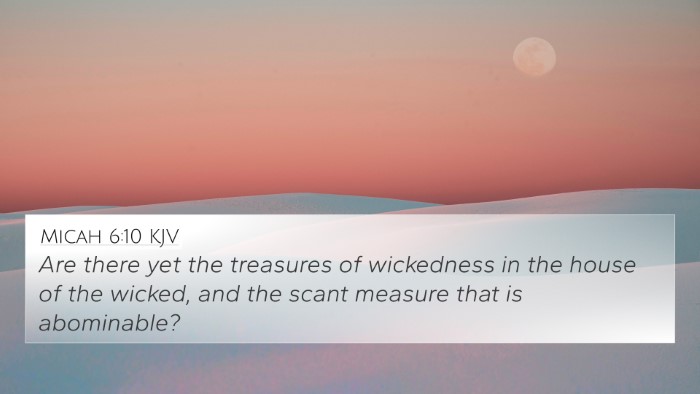Insights on Proverbs 16:8
Proverbs 16:8 states: "Better is a little with righteousness than great revenues without right." This verse carries profound meaning regarding integrity, wealth, and moral values, which has been discussed in several public domain commentaries.
Meaning and Context
The overarching theme of this verse revolves around the value of righteousness over the allure of financial gain. The wisdom literature, particularly Proverbs, often highlights the importance of living righteously and the virtues of a good character over mere material abundance.
Commentary Insights
-
Matthew Henry:
Henry emphasizes that having a small amount of wealth obtained righteously is more worthwhile than vast riches acquired through dishonest means. He argues that a life characterized by integrity, even with limited resources, is preferable and brings peace. Material wealth should never be prioritized over one's moral standing.
-
Albert Barnes:
Barnes notes that this verse contrasts the lives of the righteous and the wicked. Those aligned with righteousness experience true contentment, regardless of their economic status, whereas those who gain at the expense of others often face internal turmoil and instability. He elucidates that prosperity gained through integrity begets further blessings.
-
Adam Clarke:
Clarke reflects on the nature of right conduct in financial matters, suggesting that ethics should govern our actions, particularly in acquiring wealth. He acknowledges that the "little" signifies sufficiency, and when coupled with righteousness, leads to satisfaction that far exceeds the temporary happiness gained from ill-gotten wealth.
Biblical Cross References
To deepen our understanding of Proverbs 16:8, we can look at several related Bible verses that reinforce its themes of righteousness and moral integrity:
- Proverbs 11:4: "Riches do not profit in the day of wrath, but righteousness delivers from death."
- Proverbs 10:2: "Treasures gained by wickedness do not profit, but righteousness delivers from death."
- Proverbs 21:6: "The getting of treasures by a lying tongue is a fleeting vapor and a snare of death."
- Ecclesiastes 5:10: "He who loves money will not be satisfied with money; nor he who loves wealth with his income. This also is vanity."
- Luke 16:10: "One who is faithful in a very little is also faithful in much, and one who is dishonest in a very little is also dishonest in much."
- Matthew 6:24: "No one can serve two masters. For either he will hate the one and love the other, or he will be devoted to the one and despise the other."
- 1 Timothy 6:10: "For the love of money is a root of all kinds of evils. It is through this craving that some have wandered away from the faith and pierced themselves with many pangs."
Connections Between Related Verses
The connections found when examining these verses through a Bible verse cross-reference lens demonstrate a thematic unity regarding the moral implications of wealth. One can perform comparative Bible verse analysis to uncover deeper insights into how righteousness functions as the true currency in life.
Thematic Bible Verse Connections
- Integrity vs. Wealth: Proverbs 16:8 serves as a foundation for understanding the risks that accompany the pursuit of riches without integrity, echoed in Proverbs 11:4.
- The Lesson of Contentment: Ecclesiastes 5:10 warns against the emptiness that accompanies greed, reinforcing the message of Proverbs 16:8.
- Faithfulness and Stewardship: Luke 16:10 encourages faithfulness in small matters, paralleling the principle that integrity in our actions — even on a smaller scale — leads to greater spiritual reward.
Application of Proverbs 16:8
This verse calls for self-reflection on how we approach both our personal conduct and financial decisions in life. It charges us to weigh our actions against the scale of righteousness and to consider the long-term consequences of our choices.
Tools for Bible Cross-Referencing
For a thorough Bible cross-reference guide, utilize tools such as a Bible concordance or online databases that allow you to search for specific themes and words. This can significantly enhance your cross-referencing Bible study methods and deepen your understanding of scripture.
Conclusion
Ultimately, Proverbs 16:8 invites readers to value morality and righteousness over material gain. By understanding the connections between scripture, we find a more holistic view of God's teachings on wealth, integrity, and true prosperity.








